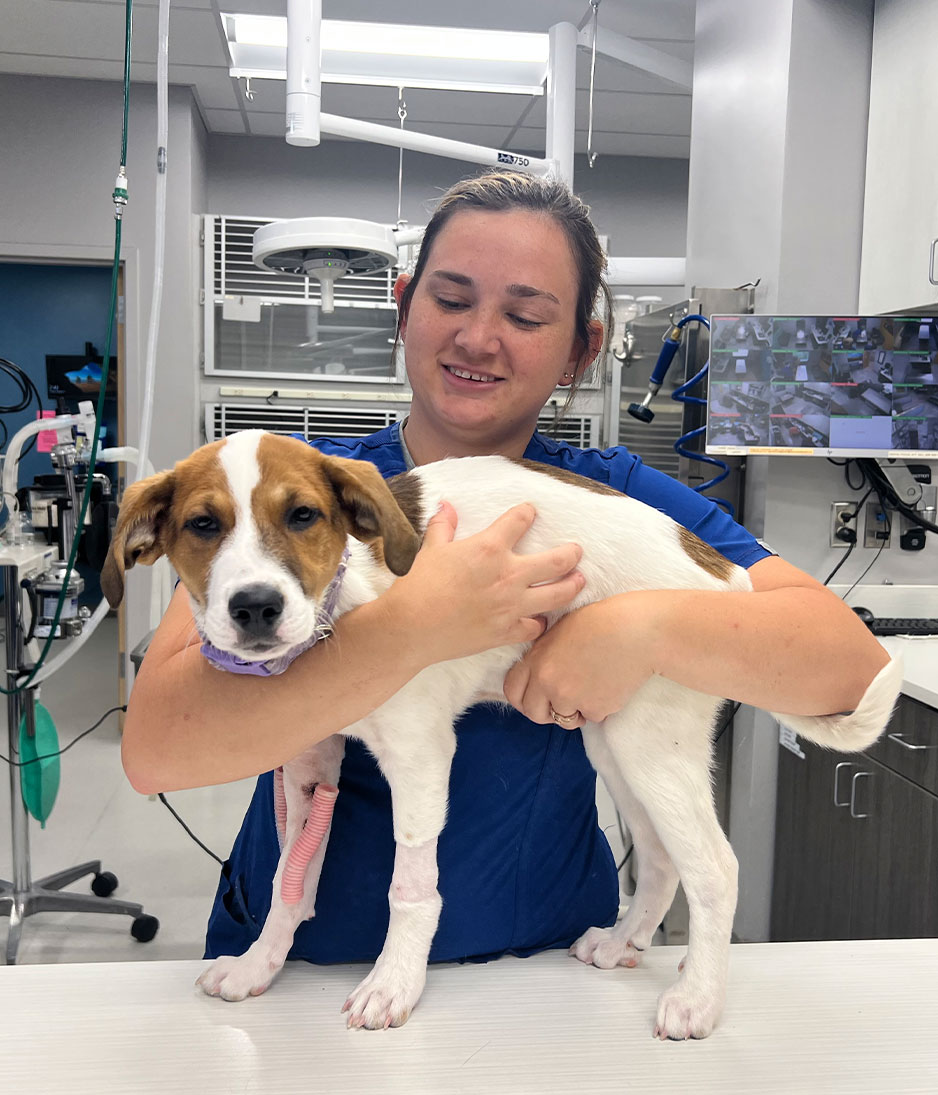A Cut Above
We built our hospital with your pet’s surgery in mind.
Surgical Procedures
Averaging more than 20 surgeries per day, we can handle:
- Ovariohysterectomy (i.e., spay)
- Neuter
- Declaw
- Mass removal, including benign and malignant masses
- Dental procedures, including tooth extractions
- Laceration repair
- Orthopedic procedures, including fracture, cranial cruciate ligament, and patellar luxation repair
- Eye procedures, including corneal ulcer repair and conjunctival flap procedures
- Abdominal surgery
- Cesarean section delivery
- Pyometra surgery
- Abdominal exploratory
- Splenectomy
- Emergency and life-saving procedures
- Ovariohysterectomy (i.e., spay)
- Neuter
- Declaw
- Mass removal, including benign and malignant masses
- Dental procedures, including tooth extractions
- Laceration repair
- Orthopedic procedures, including fracture, cranial cruciate ligament, and patellar luxation repair
- Eye procedures, including corneal ulcer repair and conjunctival flap procedures
- Abdominal surgery
- Cesarean section delivery
- Pyometra surgery
- Abdominal exploratory
- Splenectomy
- Emergency and life-saving procedures
On surgery day, your pet will experience the comfort of a familiar atmosphere and friendly faces, and receive the priority they deserve. Our state-of-the-art surgery suite was built with your pet’s needs in mind. Our surgical team, including experienced veterinarians, trained surgical technicians, and support staff, will care for your pet as if they were their own.
Whether your pet has a scheduled procedure, or an unexpected need arises, we are ready to help.
We Protect Love
We understand how stressful it can be when your pet undergoes anesthesia and surgery. Decades of experience mean that your pet is in the best hands possible—you can relax knowing we’ve got this. Your pet’s safety is our highest priority, and we will do everything we can to ensure a safe and successful surgery experience.

Safety precautions we use to keep your pet safe include:
Pre-anesthetic Evaluation
Prior to surgery, we suggest a thorough physical exam and blood work, to ensure your pet is healthy, their heart and lungs are working properly, and their liver and kidneys can metabolize the anesthetic medications.
Tailored Anesthetic Protocols
Every patient is different, and a one-size-fits-all approach is not appropriate for something as critical as anesthesia. After evaluating your pet’s overall health, we will design an individualized anesthetic protocol that best fits their needs.
Continuous Anesthetic Monitoring
Our highly trained team will be by your pet’s side throughout the entire procedure, monitoring their heart rate, respirations, blood pressure, and other vital parameters.

We Protect Love
We understand how stressful it can be when your pet undergoes anesthesia and surgery. Decades of experience mean that your pet is in the best hands possible—you can relax knowing we’ve got this. Your pet’s safety is our highest priority, and we will do everything we can to ensure a safe and successful surgery experience.
Safety precautions we use to keep your pet safe include:
Pre-anesthetic Evaluation
Prior to surgery, we suggest a thorough physical exam and blood work, to ensure your pet is healthy, their heart and lungs are working properly, and their liver and kidneys can metabolize the anesthetic medications.
Tailored Anesthetic Protocols
Every patient is different, and a one-size-fits-all approach is not appropriate for something as critical as anesthesia. After evaluating your pet’s overall health, we will design an individualized anesthetic protocol that best fits their needs.
Continuous Anesthetic Monitoring
Our highly trained team will be by your pet’s side throughout the entire procedure, monitoring their heart rate, respirations, blood pressure, and other vital parameters.
What To Expect
Our surgery coordinator will let you know if any specific preparations, such as fasting, are required before your pet’s procedure. Typically, you will drop your pet off the morning of the procedure so we can begin preparations. If your pet’s surgery is unplanned, we will perform any necessary preparations during their visit.
Prior to anesthesia, most pets receive a mild sedative to alleviate any anxiety, and help them relax. We will stay in touch throughout the day, to provide an update. Most pets require overnight hospitalization following their surgical procedure.
Contact our surgery coordinator at 316-788-1000 x146 to schedule your pet’s surgery, or if you have any questions or concerns about their upcoming procedure.



